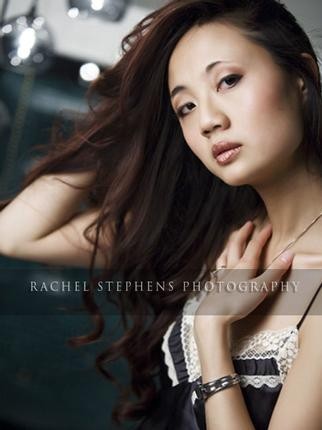
Image Credit: Rachel Stephens Photography, by way of the Nashville Examiner
At the same time that several European governments are considering trying to force advertisers and brands to include disclaimers on photoshopped promotional images for the purposes of bolstering viewers' (and particularly young girls') self esteem, American photographer Rachel Stephens has promoted the use of photoshop to her clients on the premise that image manipulation can function as a source of empowerment. Anna North's November 8th Jezebel entry "Photoshop Treatment Not Just for Models Anymore" includes an unsolicited email from Stephens forwarded by a reader of the site in which Stephens writes that "every woman deserves to see herself retouched."
Stephens' site (slightly NSFW) bills itself as "Photography for Women" and features the tagline, "Empowering Women Through Photography." The site features sample photographs, and testimonials. In an interview in the Nashville Examiner, Stephens explains that photography played a significant role in rescuing her from depression. She explains the premise of her photography and photo manipulation in terms of women's self esteem as being a response to a need she first felt herself: "Being someone who has struggled with her weight and the self image and self esteem fallout from that, I know first hand out amazing it feels to see an image of yourself devoid of the flaws you always hyper-focus on...Seeing myself beautiful was like allowing myself to accept good things in my life again...It opened so many doors for me to live life again" (Nashville Examiner).

Image Credit: Rachel Stephens Photography, by way of the Nashville Examiner
Stephens' photography presents a new side of the debate on photo manipulation. Rather than being used to promote the sale of clothing by presenting models who are digitally tailored to the clothes, Stephens captures consenting women who desire their images to be manipulated and corrects their flaws. One might argue that working toward accepting "the flaws you hyper-focus on," or at least an earnest attempt not to "hyper-focus" on them would be better long term solutions. Whether or not these pictures boost esteem in the long run seems to be a matter of one's personal outlook. Stephens' photography grants its subjects the right to look vicariously at manipulated images and to counter a world of manipulated images with the confidence that they too can be made to appear "ideal" or "perfect" through photoshop.
A number of Jezebel commenters defend Stephens' photography. One user suggests that there is no reason to approach Stephens' work with as much "negativity" as North does in her article and suggests that image manipulation, in this case, seems actually empowering. For my part, I wasn't able to detect "negativity" in North's claims that there is "nothing wrong with wanting a retouched photo of yourself if that's your thing" or in her reaction to Stephens' presentation of her photo manipulation on her site with "waist-whittling animations" that she finds "a little disturbing" (Jezebel). Some commenters point out that most professional photographers do some degree of image manipulation while others claim to be more reluctant to accept significantly altered images of themselves, preferring high-quality realistic images instead.

Image Credit: Rachel Stephens Photography, by way of the Nashville Examiner
In an age where some advertisers insist that the manipulations that lead to their presentation of an "ideal" makes their products more appealing to real women, Stephens suggests that making real women live up to these artificial ideals is a inroad to empowerment. While I remain reluctant to accept that the solution for a photoshop saturated world is more photoshop, particularly, as a commenter on Jezebel points out, when this "empowering" photoshop commits some of the same sins as the most controversial photoshopped ads including cutting down waistlines to unnatural proportions and occasionally erasing belly buttons, I am fascinated by Stephens' outlook on the power of image manipulation to affect self-esteem.
I'll conclude with one of Stephens' statements from the Examiner piece: "Rachel will show the women their photographs, during shooting, and "I always hear 'is that me? Who is that!' followed by girlish laughter and often times a few tears.' When her subjects leave, Rachel sees the women feel better about themselves than when they came in, 'and they earned it. It is no small task to strip down, literally, to you most vulnerable self and allow yourself to be photographed. I don't take that lightly and am very humbled by each woman who gives me her trust in this way. I strive to give them the gift of their true beauty and I hope that they allow those feelings to stay with them'" (Examiner).
Comments
A genuine question: what do
A genuine question: what do you think Stephens means by "'their true beauty'"?